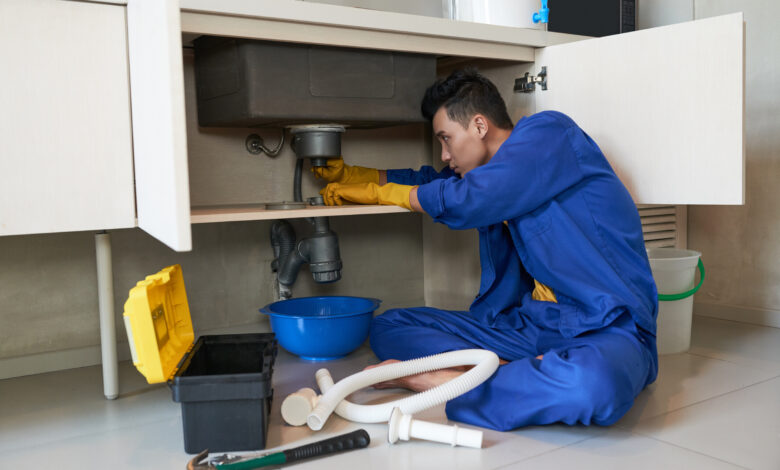How to Prevent and Clear Blocked Drains: Expert Advice from Drainage Engineers

Blocked drains are a common household issue that many of us face. Whether it’s a slow-draining sink, a foul odor wafting from the bathroom, or a completely clogged drain that halts water flow, blockages are not only inconvenient but can also lead to costly repairs if not addressed in a timely manner, which is why many prefer to use property maintenance 247 services. This article will guide you through understanding the causes of blocked drains, how to prevent them, and when to call in a professional drainage engineer for help. We’ve gathered expert advice and practical tips to ensure your drains stay clear and functioning smoothly.
Why Blocked Drains Occur: Understanding the Causes
Before tackling the issue of clearing blockages, it’s crucial to understand what causes them in the first place. According to drainage engineers, most blockages stem from a few common culprits:
Grease and Fat Build-up:
Many homeowners are unaware that pouring grease or fat down the kitchen sink can lead to serious drainage issues. As the grease cools, it solidifies, creating a sticky mess that traps other debris, leading to clogs.
Tree Roots:
In older homes, or those with large, mature trees nearby, roots can invade underground drainage pipes. The roots seek moisture, often penetrating pipes and causing significant blockages. Drainage engineers frequently see this in areas with older, clay or cast iron pipes.
Hair and Soap Residue:
In bathroom drains, especially those in showers or bathtubs, hair mixes with soap, shampoo, and conditioner residue to form thick clumps that clog pipes. This issue is common in households with long-haired individuals.
Foreign Objects:
Items like food scraps, wipes (even those labeled as “flushable”), and small toys are often flushed down the toilet or washed down the drain, causing obstructions.
Aging Pipes:
In some cases, pipes themselves may collapse or deteriorate over time, leading to blockages. This is particularly common in homes with old plumbing systems made of materials like galvanized steel or clay.
Preventing Blocked Drains: Expert Tips for Homeowners
Preventing blockages before they happen is key to avoiding costly repairs and the frustration of dealing with clogged drains. Drainage engineers advise homeowners to adopt the following preventive measures:
Routine Maintenance and Inspections
Regular maintenance is essential to keeping your drains in good working order. Scheduling an annual drain inspection with a professional can help identify potential issues like tree root intrusion or pipe corrosion before they become major problems. A professional drainage engineer can use specialized tools such as CCTV cameras to inspect your pipes for early signs of damage or blockages.
Install Drain Screens or Mesh Covers
Simple and inexpensive tools like drain screens or mesh covers can prevent hair, food scraps, and other debris from entering your pipes. These tools are especially effective in bathrooms and kitchens where waste materials are more likely to be washed away.
Proper Disposal of Grease and Fat
One of the easiest ways to prevent clogs is to dispose of cooking grease properly. Instead of pouring it down the sink, pour the grease into a container and dispose of it in the trash. Using absorbent materials like paper towels to wipe grease from pots and pans before washing them can also help.
Be Mindful of What You Flush
Even “flushable” wipes can cause serious blockages. Many plumbing experts argue that “flushable” wipes do not break down as effectively as toilet paper, leading to clogs. Be sure to only flush toilet paper and human waste. For everything else, use the trash can.
Manage Tree Roots
If you live in an area with large trees, it’s important to keep an eye on their proximity to your drainage system. Tree roots can enter pipes and cause obstructions over time. Some homeowners opt for root barriers or hire professionals to trim back trees that could potentially invade their plumbing system.
Educate the Household
If you have a family, make sure everyone is on the same page about what should and shouldn’t go down the drain. This is especially important for children who may not fully understand the potential consequences of flushing objects like toys or wipes.
How to Clear Blocked Drains: DIY Methods
While some blockages may require professional help, there are several DIY methods homeowners can try to clear a minor blockage. Before attempting any of these methods, make sure you have the proper tools, and always wear gloves and protective eyewear.
Boiling Water
For grease clogs, one of the easiest methods is pouring boiling water down the drain. This can help break down the grease and flush it away. To do this, simply boil a kettle of water and carefully pour it down the drain in stages. Wait a few minutes between each pour to allow the water to work its magic.
Baking Soda and Vinegar
A tried-and-tested natural solution, baking soda and vinegar work well for minor clogs. To use this method, pour half a cup of baking soda down the drain, followed by half a cup of vinegar. Cover the drain and let the mixture sit for 30 minutes. Afterward, flush with boiling water to clear the debris. This combination can help break down soap scum, hair, and mild grease buildups.
Plunging
If the water is slow to drain, a plunger may do the trick. Make sure the plunger creates a seal around the drain and push it up and down rapidly. This should dislodge the clog and get your drain flowing again. If plunging doesn’t work, it might be time to try a drain snake.
Using a Drain Snake
A drain snake (or auger) is a long, flexible tool that can be used to physically break up or retrieve blockages. Insert the snake into the drain and turn the handle to allow the coil to move through the pipes. Once you feel resistance, turn the handle to either break up the blockage or hook the debris so you can pull it out. A drain snake is effective for deeper blockages that don’t respond to plunging or natural remedies.
When to Call a Professional: Knowing Your Limits
While DIY methods are effective for minor clogs, there are times when it’s best to call in a professional drainage engineer. Experts recommend contacting a pro if:
- The Blockage Persists: If your DIY methods haven’t cleared the clog after several attempts, it’s time to call in the experts. A professional can determine the underlying cause and clear the blockage safely.
- You Notice Unpleasant Odors: Foul odors emanating from your drain are often a sign of organic matter stuck in the pipes. A drainage engineer can remove the blockage and eliminate odors.
- Frequent Clogs: If you’re frequently dealing with clogs, this could be a sign of a bigger issue like tree root intrusion or deteriorating pipes. A professional can use CCTV cameras to inspect the problem.
- You Need to Avoid Further Damage: Attempting to clear blockages with chemicals or tools improperly can damage your plumbing system. A pro will have the right equipment and knowledge to fix the issue without causing additional harm.
Long-Term Solutions: Ensuring Clear Drains for Years to Come
Beyond regular maintenance and DIY clearing methods, there are some long-term solutions to ensure your drains remain clog-free:
Pipe Upgrades:
Older pipes, particularly those made of clay or galvanized steel, are more prone to blockages and damage. Consider upgrading to modern materials like PVC or PEX, which are more durable and less likely to clog.
Regular Professional Drain Cleaning:
Scheduling annual or biannual professional drain cleaning can help maintain optimal water flow. High-pressure water jetting is an effective method used by drainage engineers to clear grease, tree roots, and debris buildup.
Smart Drainage Solutions:
Some homeowners are opting for smart plumbing systems that can alert you to blockages or changes in water flow before they become major issues. These systems can save time and money by catching problems early.
Conclusion
Blocked drains may seem like a minor inconvenience, but when left unchecked, they can cause major plumbing problems, water damage, and health hazards. By following expert advice on preventing blockages, using safe and effective DIY methods, and knowing when to call a professional, you can keep your drains functioning smoothly for years to come. With the right care and attention, your home’s plumbing system will remain reliable and problem-free.


